During an emotional ceremony, the ‘Empress Theophano’ Prize was presented to Special Olympics and Chairman Dr. Timothy Shriver for promoting the rights of persons with intellectual disabilities and creating a more inclusive society

Thessaloniki, October 24th, 2024 – The 5th ‘Empress Theophano’ Prize was presented to Special Olympics, its Chairman, Dr. Timothy Shriver and CEO Mary Davis, yesterday during a particularly moving ceremony held at the Rotunda Monument, in the presence of luminaries from across the world, and with the active participation of Special Olympics athletes
This year, the ‘Empress Theophano’ Prize, which aims to showcase persons and organisations within and outside Europe who embody European and universal values, highlighted the social role of sports, through the vision of Special Olympics for a world of acceptance, inclusivity and equal opportunities for all, regardless of ability. Through the power of sports, people with intellectual and developmental disabilities discover new strengths and abilities, skills and successes. What first started as a summer day camp in 1962 by Eunice Kennedy Shriver, the organization’s founder and mother of Dr. Shriver, has since evolved to be a global movement for inclusion that currently supports 4 million people with intellectual and developmental disabilities in over 200 countries and nations around the world.
In his opening speech, the Chairman of the Governing Council of the Theophano Foundation, Stavros Andreadis, stressed that humanity was and remains the perennial focus over the five-year course of the Prize, and that the overarching objective is to highlight values that light the way towards respect for each person’s life, the way to a better global society in a world of cooperation and mutual understanding. “This year, I would say perhaps more emphatically than ever, the Empress Theophano Prize focuses on humanity: on human willpower, strength, effort, which never stops despite all adversities. This year’s Prize highlights these very human values, through the example of Special Olympics, their athletes and volunteers, which can be summed up in the following wise words: “Let me win. But if I cannot win, let me be brave in the attempt”. This is the deeper meaning of today’s presentation: the bravery of effort. Every day, the people of Special Olympics, athletes and volunteers, through the medium of sports, exceed their limitations, change their lives and transform society itself through their example,” stressed Mr Andreadis.
The Chairman of the Advisory Council of the Theophano Foundation and President Emeritus of the European Council, Herman Count Van Rompuy, called this year’s Prize special in many respects, especially at a time when two wars are raging just 1,300 kilometres from Thessaloniki. “The attention each athlete receives in Special Olympics stands in stark contrast to the total lack of importance attached to each individual in the two war zones. The enthusiasm and fraternity of Special Olympics athletes is an antidote to today’s evils. That is why this jury and our Foundation itself are so proud today,” he stated. He congratulated Special Olympics, stressing that it is much more than a sporting event, as it is not just about medals, but about values such as unity and respect, and underlines the basic principle that every person counts, whoever they are, whatever their limitations or gifts.
Dr. Timothy Shriver expressed his gratitude for the Prize, noting that it was an accolade not just for theorganisation but for a movement for human dignity. . He also referred to the programmes being implemented around the world by Special Olympics, which aims to abolish stigmatisation and marginalisation. “We accept this great prize in the name of the uniter of East and West – Theophano. We accept it as a sign that our athletes have won. They have won victories of their own. Their victories over division, over arrogance and over despair. We also accept it in the promise of bravery. This prize aims to reimagine Europe. That will require bravery. If it’s bravery that is needed, the athletes of Special Olympics have it. We commit to joining the Foundation in this noble mission to reimagine Europe. We are here to celebrate what Special Olympics athletes are asking for. We want all schools in the world to teach inclusivity. We demand that health systems change and adapt to the needs of people with intellectual disabilities. All children, all adults, should be able to participate everywhere,” he said. He added, “we acan heal the differences that divide us,” and called on athletes to continue to be brave, bold and victorious, but to also show the world what it means to be free.
Fokion Karavias, CEO of Eurobank, the sponsor of the award ceremony for a fifth year, also addressed the audience. “Respect for human rights is a cornerstone of civilisation. And its measure is the inclusion and recognition of the potential inherent in every human being. The athletes and the entire community of Special Olympics set an absolute example of how sports can become a tool for including people with intellectual disabilities and motivate society to embrace the goal of equal opportunities for all its members. It is our pleasure and honour to have supported the ‘Empress Theophano’ Prize since its inception, as it recognises the contribution of individuals and organisations that promote fundamental universal values,” he said.
The ceremony was presented by journalist and editor of ‘Kathimerini’ newspaper, Alexis Papachelas along with Special Olympics Hellas basketball athlete, Agis Diakopoulos. The ceremony ended with a symbolic event of music, screenings and dance, where the music of the ‘MOYSA’ Youth Symphony Orchestra of the Thessaloniki Concert Hall was combined with a demonstration by unified group of gymnasts, Special Olympics athletes as well as athletes of the ‘Wolves Team’ World Champion gymnastics team. During an intensely emotional event, the artistic programme confirmed in the best possible way the concepts highlighted by the Prize itself: the joy of participation, the power of will, the bravery of effort, acceptance, inclusivity.
The Award Ceremony was honoured with the presence of the following: representing the President of the Hellenic Government, Ms Aikaterini Papakosta, Deputy Minister of Social Cohesion and Family Affairs; Deputy Minister of Interior, responsible for Macedonia-Thrace, Mr Kostas Gioulekas; Mr Stelios Angeloudis, the Mayor of Thessaloniki; Mrs Anna Diamantopoulou, President of ‘DIKTIO’ Network for Reform in Greece and Europe; Mr Jerrier Ismail, US Consul to Thessaloniki; Mr Vasilis Kaskarelis, Ambassador Emeritus and former Minister of Foreign Affairs; Mr Dionysis Kodellas, Ambassador Emeritus and President of Special Olympics Hellas, numerous members of the Boards of Special Olympics International and Special Olympics Hellas, as well as prominent members of the Advisory Council of the Theophano Foundation, including: Chantal Colleu-Dumond – Director of Domaine de Chaumont-sur-Loire (France); Tarja Halonen – former President of Finland (Finland); Maria Luisa Poncela – former Secretary of State of Spain (Spain); Michel Praet – Vice-President, Museum of European History (Belgium); Eveline Riemen-van der Ham – Vice-President, Nexus Institute (Netherlands).
Round Table discussion on inclusive sports
Opening the dialogue on important issues related to social inclusion and inclusivity of people with intellectual disabilities, the Theophano Foundation is also organising today, Thursday, October 24th, 2024, at 18:00, at Thessaloniki Concert Hall (Emilios Riadis Hall), a Round Table discussion entitled ‘Inclusive Sports: Driving Human and Social Development for a Changing Europe’. Leading representatives of Special Olympics, including its Chairman, Dr Timothy Shriver, and its CEO, Mrs Mary Davis, international athletes and people close to the community of people with intellectual disabilities, will contribute to the subject through their different perspectives, while the participation of Greek athletes and their families will highlight the key message of the power of sports and the ways inclusion strengthens families, societies and nations.
Admission to the event is free of charge. Registration is required by filling out a participation form https://forms.gle/cjp8Qv4tscyHp6nA8)
Earlier today, at 10:30 am, a Unified® Run of 1km was organised on the New Waterfront of Thessaloniki, in which athletes from the training programmes of the wider region of Thessaloniki, coaches, family members of Special Olympics Hellas athletes, students of the Inclusive Sports Schools, partners and friends of Special Olympics participated.
THE AWARD CEREMONY IS SPONSORED BY

THE ROUND TABLE DISCUSSION IS SPONSORED BY

OFFICIAL AIR CARRIER SPONSOR

WITH THE KIND SUPPORT OF


About Special Olympics
Founded in 1968, Special Olympics is a global movement to end discrimination against people with intellectual disabilities. Special Olympics foster acceptance of all people through the power of sport and programming in education, health and leadership. With nearly four million athletes and Unified Sports® partners and one million coaches and volunteers in more than 170 countries, Special Olympics delivers more than 30 Olympic-type sports and nearly 50,000 games and competitions every year. Further information SpecialOlympics.org and on all social media accounts: X, Facebook, YouTube, Instagram, TikTok, and LinkedIn.

About the Theophano Foundation
The purpose of the Theophano Foundation, launched in 2019, is to promote those human values which characterise Europe and to honour exceptional examples of these values in action. In doing so, its purpose is also to underline and build upon the powerful historical resonance of Eastern European culture in shaping and living these values, be it in statecraft, education, religious tolerance, scientific progress or artistic and sporting endeavour. www.theophano.eu

Media enquiries
Andrew Fielding, Senior Advisor, Theophano Foundation: andrew.fielding@skynet.be or +32 478 915157
Vicky Papadimitriou, Project Coordinator, Theophano Foundation: info@theophano.eu or +30 693 722 9858

MORE INFORMATION: www.theophano.eu
The Empress Theophano Prize was created in order to reward individuals or organizations which have made, or are making, an outstanding contribution to building bridges among people, nations, ideologies, to improving mutual understanding of our diverse roots, and therefore human betterment.
Since the establishment of the Prize in 2019, this initiative expresses, in the most noble way, the imperative and urgent need for contemporary cooperation. In 2020 the Prize, focused on Education, was awarded to the Erasmus Programme of the European Union. It was received personally by European Commission President Ursula von der Leyen. In 2021 the focus was on Science: Dr. Uğur Şahin and Dr. Özlem Türeci, the scientist couple who developed the first vaccine against the corona virus, were the recipients of the award for their dedication to the common good. In 2022, the Prize highlighted the key role of Art as a common ground for mutual understanding and was awarded to the world-renowned conductor Daniel Barenboim and his initiative of West-Eastern Divan Orchestra, a highly symbolic project for building bridges between peoples. In 2023 it was awarded to the United Nations and the UN Secretary-General, António Gutteres, focusing on the humanitarian role of multilateral leadership.
The Prize is awarded every year in the historic Rotunda in Thessaloniki, a landmark monument and heritage site signifying the multicultural influences of Europe: Roman, Byzantine, Orthodox, Ottoman, and Greek.
THE 2020, 2021, 2022 EMPRESS THEOPHANO PRIZE
EMPRESS THEOPHANO PRIZE 2020 The 2020 Empress Theophano Prize at a glance
EMPRESS THEOPHANO PRIZE 2021 The 2021 Empress Theophano Prize Ceremony at a glance
EMPRESS THEOPHANO PRIZE 2022 Ceremony Speeches & Ceremony Video
EMPRESS THEOPHANO PRIZE 2023 Ceremony Speeches & Ceremony Video


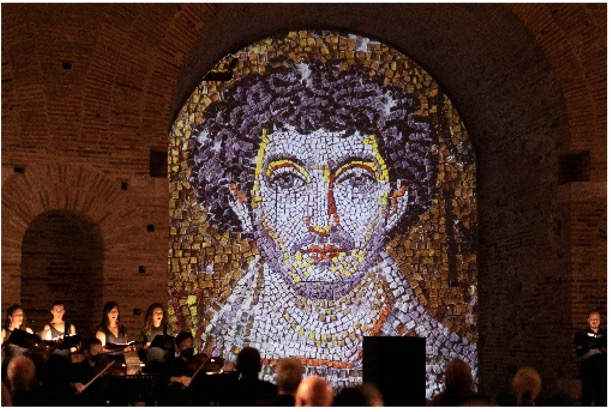





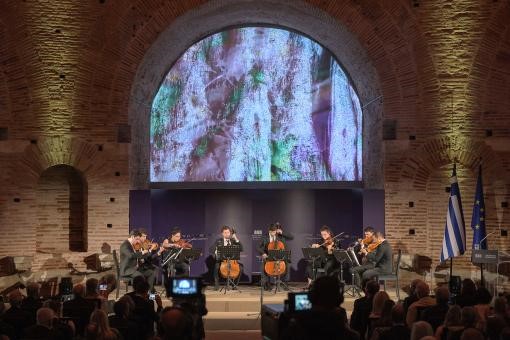


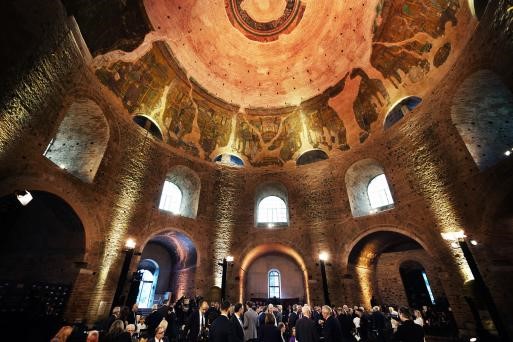



The Advisory Council
Chairman
Herman Van Rompuy
President Emeritus of the European Council
Minister of State of Belgium (BE)
Members
Mary McAleese
Former President of Ireland | Professor of Children, Religion and Law, University Glasgow (IRL)
Chantal Colleu-Dumond
Directrice du Domaine de Chaumont-sur-Loire (F)
Nikiforos Diamandouros
Former European Ombudsman (GR)
Tarja Halonen
Former President of Finland (FI)
Sonja Licht
Sociologist, Former Chair of Open Society Foundation (RS)
Alessandra Mignolli
Professor, Sapienza University, Rome (I)
Sigrid Müller
Professor, University of Vienna (A)
Camilla Nothhaft
Professor, Lund University (S)
Maria Luisa Poncela
Former Secretary of State for Trade, Secretary General for Science and Innovation of Spain (ES)
Michel Praet
Vice-President, Museum of European History (BE)
Georges Prevelakis
Professor Emeritus, Paris-Sorbonne University (FR)
Sir Ivan Rogers
Former UK Ambassador to the EU (UK)
Eveline Riemen-van der Ham
Vice-President Nexus Institute (NL)
Vassilios Skouris
Former President, European Court of Justice of the EU (GR)
Rita Süssmuth
Former President of the German Parliament (DE)
Panos Tzonos
Professor Emeritus, Aristotle University of Thessaloniki (GR)
The Governing Council
Chairman
Stavros Andreadis
Honorary President, SANI/IKOS Group
Chairman, Cultural Society of Entrepreneurs of Northern Greece (GR)
Members
Members
Nikolaos Efthymiadis
Chairman, EFTHYMIADIS Agrotechnology Group
Honorary Chairman, Federation of Greek Industries (GR)
Evangelos Gerovassiliou
Chairman, Gerovassiliou Wines (GR)
Constantinos Gleoudis
Chairman, Kavex
Member of the Board, Hellenic Society for the Environment and Cultural Heritage (GR)
Theodoros Ikonomou
Chairman, Greek Forest Property Association
Head of a forest management and wood production firm (GR)
Nada Korac Kakabadse
Professor of Policy, Governance and Ethics, Henley Business School, University of Reading (UK)
George Mylonas
Chairman, Alumil Group (GR)
Sonja Puntscher-Riekmann
Professor Emeritus of Political Theory and European Politics, University of Salzburg (AT)
Stefan Schepers
Secretary General, High Level Groups on EU Policy Innovation (BE)
Foundation Member
Vassos Konstantinidis, Chairman, INART (GR)
Empress Theophano
Empress Theophano, who inspired this prize, is a historic figure of Europe who played a significant role in its development during the 10th century.
The niece of Emperor John I Tzimiskes, she married Otto II and was crowned Holy Roman Empress as his wife. Following his death, she maintained the title of Empress. Her historic presence in Western Europe, dedicated to improving relations between East and West, offered a positive contribution to the cultural renaissance of western European territories, introducing to the west the central role women had in Byzantine society and transferring significant influence from the flourishing Byzantine empire in the fields of education, the arts, commerce, and health, while working to advance civil governance, promoting it over the military.
Empress Theophano is buried at the Cathedral of St Pantaleon in Cologne, Germany.
The Rotunda Monument
The emblematic monument of Thessaloniki, was constructed in the early 4th century AD, on the turning point between the pagan with the Christian world, probably as a temple for ancient cult worship or as a mausoleum for Constantine the Great (306-337). This circular, domed building measures 29.80 meters in height, 24.50 meters in diameter, its walls are 6.30 meters thick and can only be compared architecturally to the Pantheon in Rome. Not long after it was built and during the early years of the long-lived Byzantine Empire (330-1453), the Rotunda was turned into a Christian church with the addition of a sanctuary on its eastern side. The interior was decorated with Early Byzantine (4th- 6th c. AD) wall mosaics of unique artistry and beauty. It was Thessaloniki’s cathedral church (metropolis) between 1524 and 1591, the year in which it was converted to a mosque by the Ottoman conquerors. It remained in use as a mosque until the city’s liberation in 1912. Its dedication since that time to Saint George (Agios Georgios) is owing to the small neighboring church of this name. The mosaic decoration of the Rotunda is a masterpiece of Late Antique art.
Text source: http://galeriuspalace.culture.gr/en/monuments/rotonta/
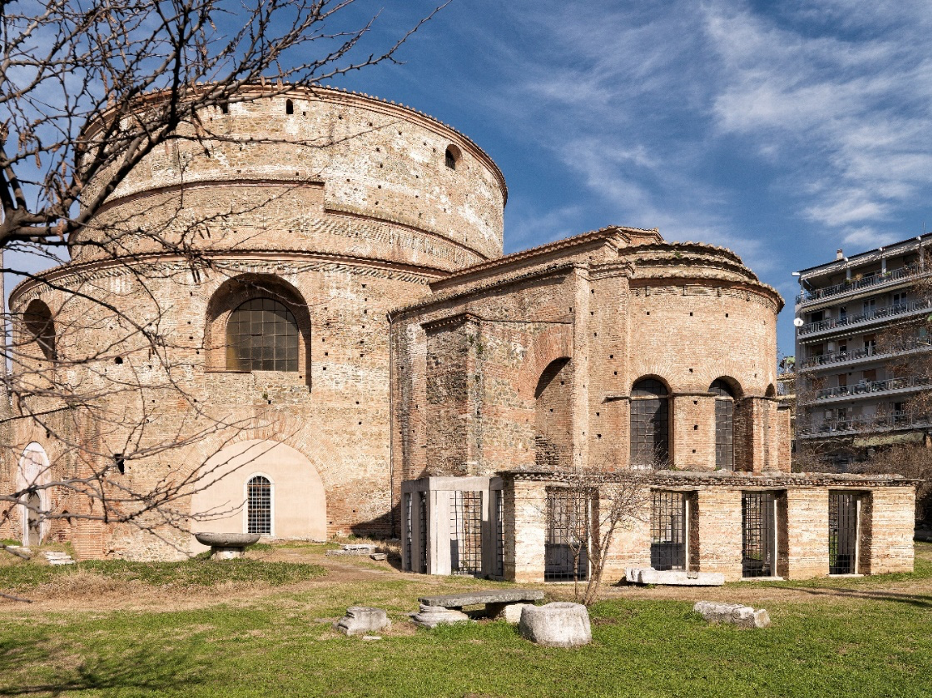
Photo credits: Ephorate of Antiquities of Thessaloniki City.
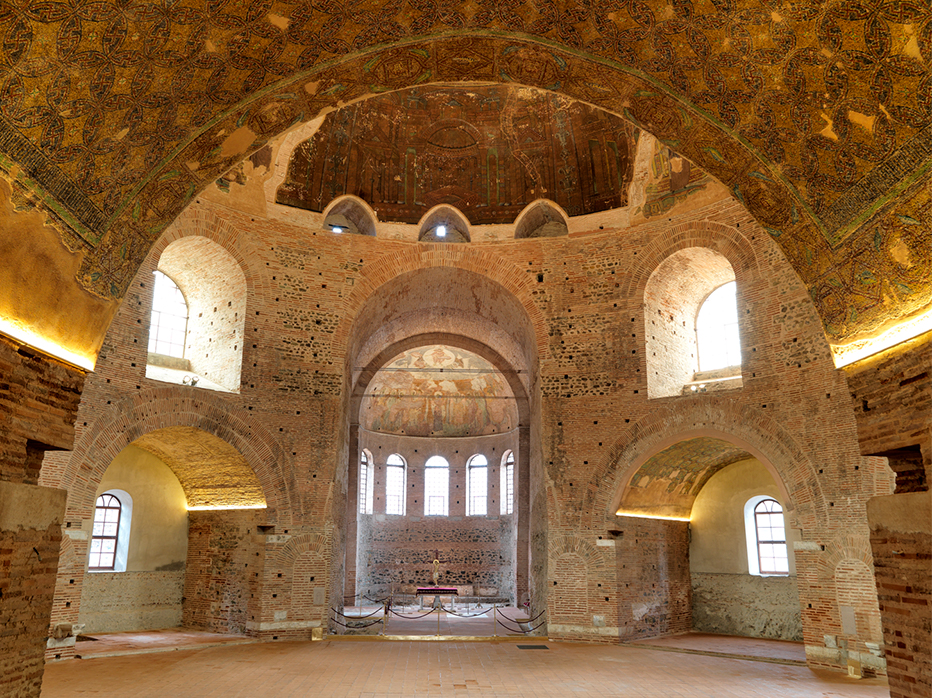
Photo credits: Studio 8 Photos, Efi Panagoula.
